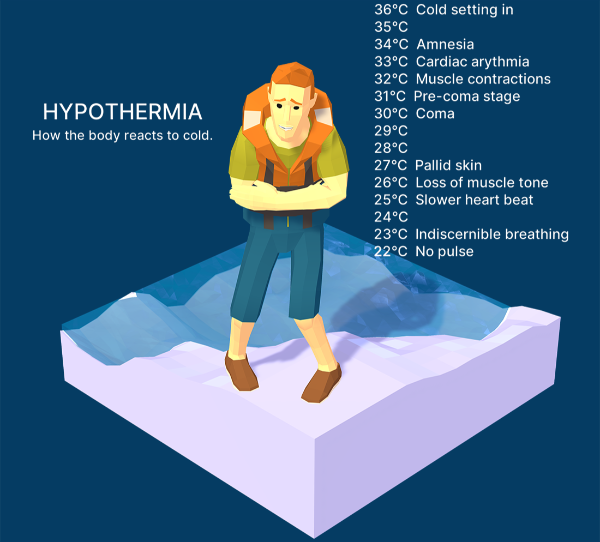Hypothermia, How to Recognize and Prevent

Image source: https://aceboater.com/en/protection-treatment-hypothermia
What is Hypothermia
Hypothermia can be a medical emergency that occurs when your body loses heat faster than it can produce heat, causing a dangerously low body temperature. Normal body temperature is around 37 C. Hypothermia occurs as your body temperature falls below 35 C.
Hypothermia is often caused by exposure to cold weather or immersion in cold water.
Symptoms
Shivering is likely the first thing you'll notice as the body temperature starts to drop because it's your body's automatic defence against cold temperature — it’s an attempt to warm itself.
Mild Hypothermia
Signs and symptoms of mild hypothermia include:
- Shivering
- Dizziness
- Hunger
- Nausea
- Faster breathing
- Trouble speaking
- Slight confusion
- Lack of coordination
- Fatigue
- Increased heart rate
Moderate to Severe Hypothermia
As your body temperature drops, signs and symptoms of moderate to severe hypothermia include:
- Shivering, although as hypothermia worsens, shivering stops
- Clumsiness or lack of coordination
- Slurred speech or mumbling
- Confusion and poor decision-making, such as trying to remove warm clothes
- Drowsiness or very low energy
- Lack of concern about one's condition
- Progressive loss of consciousness
- Weak pulse
- Slow, shallow breathing
Someone with hypothermia usually isn't aware of his or her condition because the symptoms often begin gradually. Also, the confused thinking associated with hypothermia prevents self-awareness. The confused thinking can also lead to risk-taking behaviour.
It’s important to know the symptoms so we can recognize them in other paddlers as they may not recognize them in themselves.
Causes
Hypothermia occurs when your body loses heat faster than it produces it. The most common cause of hypothermia is exposure to cold-weather or cold water. But prolonged exposure to any environment colder than your body can lead to hypothermia if you aren't dressed appropriately or can't control the conditions.
Prevention and Management
- Understand the conditions and risks of where you are paddling - water temp and air temp will be factors
- Paddle within your abilities and always paddle with a buddy in potentially hazardous situations - Know the signs of hyperthermia and know how to help other paddlers in distress (assisting them back on their board and toeing)
- Dress appropriately for the conditions - early spring and fall means dry suits or wetsuits, insulated booties, head coverings, and neoprene gloves (Never wear cotton or fabrics that will pull head from your body when wet)
- Wear a suitable PFD, avoid fanny pack manual inflate PFDs in cold water conditions, wear something that works as soon as you hit the water. A full PFD will also provide warmth.
- Reduce exposure to the cold
- Have a dry change of cloths and a way to warm yourself up if you get wet
- Paddle in areas that allow for quick and easy ways to get off the water and warm yourself
Risk Factors
Factors that can increase the risk of Hypothermia.
- Exhaustion - Your tolerance for cold diminishes when you are fatigued.
- Older age - The body's ability to regulate temperature and to sense cold may lessen with age.
- Very young age - Children lose heat faster than adults do. Children may also ignore the cold because they're having too much fun to think about it.
- Mental problems - People with a mental illness, dementia or other conditions that interfere with judgement may not dress appropriately for the weather or understand the risk of cold weather.
- Alcohol and drug use - Alcohol may make your body feel warm inside, but it causes your blood vessels to expand, resulting in more rapid heat loss from the surface of your skin. The body's natural shivering response is diminished in people who've been drinking alcohol. In addition, the use of alcohol or recreational drugs can affect your judgement about the need to get inside or wear warm clothes in cold-weather conditions. If a person is intoxicated and passes out in cold weather, he or she is likely to develop hypothermia.
- Certain medical conditions - Some health disorders affect your body's ability to regulate body temperature. Examples include an underactive thyroid (hypothyroidism), poor nutrition or anorexia nervosa, diabetes, stroke, severe arthritis, Parkinson's disease, trauma, and spinal cord injuries.
- Medications - Some drugs can change the body's ability to regulate its temperature. Examples include certain antidepressants, antipsychotics, narcotic pain medications and sedatives.
